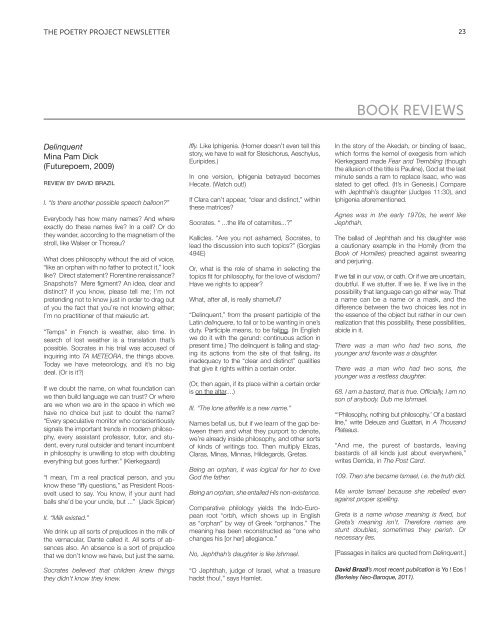Create successful ePaper yourself
Turn your PDF publications into a flip-book with our unique Google optimized e-Paper software.
THE POETRY PROJECT NEWSLETTER23BOOK REVIEWSDelinquentMina Pam Dick(Futurepoem, 2009)review by david brazilI. “Is there another possible speech balloon?”Everybody has how many names? And whereexactly do these names live? In a cell? Or dothey wander, according to the magnetism of thestroll, like Walser or Thoreau?What does philosophy without the aid of voice,“like an orphan with no father to protect it,” looklike? Direct statement? Florentine renaissance?Snapshots? Mere figment? An idea, clear anddistinct? If you know, please tell me; I’m notpretending not to know just in order to drag outof you the fact that you’re not knowing either;I’m no practitioner of that maieutic art.“Temps” in French is weather, also time. Insearch of lost weather is a translation that’spossible. Socrates in his trial was accused ofinquiring into TA METEORA, the things above.Today we have meteorology, and it’s no bigdeal. (Or is it?)If we doubt the name, on what foundation canwe then build language we can trust? Or whereare we when we are in the space in which wehave no choice but just to doubt the name?“Every speculative monitor who conscientiouslysignals the important trends in modern philosophy,every assistant professor, tutor, and student,every rural outsider and tenant incumbentin philosophy is unwilling to stop with doubtingeverything but goes further.” (Kierkegaard)“I mean, I’m a real practical person, and youknow these “iffy questions,” as President Rooseveltused to say. You know, if your aunt hadballs she’d be your uncle, but ...” (Jack Spicer)II. “Milk existed.”We drink up all sorts of prejudices in the milk ofthe vernacular, Dante called it. All sorts of absencesalso. An absence is a sort of prejudicethat we don’t know we have, but just the same.Socrates believed that children knew thingsthey didn’t know they knew.Iffy. Like Iphigenia. (Homer doesn’t even tell thisstory, we have to wait for Stesichorus, Aeschylus,Euripides.)In one version, Iphigenia betrayed becomesHecate. (Watch out!)If Clara can’t appear, “clear and distinct,” withinthese matrices?Socrates. “ ...the life of catamites...?”Kallicles. “Are you not ashamed, Socrates, tolead the discussion into such topics?” (Gorgias494E)Or, what is the role of shame in selecting thetopics fit for philosophy, for the love of wisdom?Have we rights to appear?What, after all, is really shameful?“Delinquent,” from the present participle of theLatin delinquere, to fail or to be wanting in one’sduty. Participle means, to be failing. (In Englishwe do it with the gerund: continuous action inpresent time.) <strong>The</strong> delinquent is failing and stagingits actions from the site of that failing, itsinadequacy to the “clear and distinct” qualitiesthat give it rights within a certain order.(Or, then again, if its place within a certain orderis on the altar....)III. “<strong>The</strong> lone afterlife is a new name.”Names befall us, but if we learn of the gap betweenthem and what they purport to denote,we’re already inside philosophy, and other sortsof kinds of writings too. <strong>The</strong>n multiply Elizas,Claras, Minas, Minnas, Hildegards, Gretas.Being an orphan, it was logical for her to loveGod the father.Being an orphan, she entailed His non-existence.Comparative philology yields the Indo-Europeanroot *orbh, which shows up in Englishas “orphan” by way of Greek “orphanos.” <strong>The</strong>meaning has been reconstructed as “one whochanges his [or her] allegiance.”No, Jephthah’s daughter is like Ishmael.“O Jephthah, judge of Israel, what a treasurehadst thou!,” says Hamlet.In the story of the Akedah, or binding of Isaac,which forms the kernel of exegesis from whichKierkegaard made Fear and Trembling (thoughthe allusion of the title is Pauline), God at the lastminute sends a ram to replace Isaac, who wasslated to get offed. (It’s in Genesis.) Comparewith Jephthah’s daughter (Judges 11:30), andIphigenia aforementioned.Agnes was in the early 1970s, he went likeJephthah.<strong>The</strong> ballad of Jephthah and his daughter wasa cautionary example in the Homily (from theBook of Homilies) preached against swearingand perjuring.If we fail in our vow, or oath. Or if we are uncertain,doubtful. If we stutter. If we lie. If we live in thepossibility that language can go either way. Thata name can be a name or a mask, and thedifference between the two choices lies not inthe essence of the object but rather in our ownrealization that this possibility, these possibilities,abide in it.<strong>The</strong>re was a man who had two sons, theyounger and favorite was a daughter.<strong>The</strong>re was a man who had two sons, theyounger was a restless daughter.68. I am a bastard, that is true. Officially, I am noson of anybody. Dub me Ishmael.“‘Philosophy, nothing but philosophy.’ Of a bastardline,” write Deleuze and Guattari, in A ThousandPlateaus.“And me, the purest of bastards, leavingbastards of all kinds just about everywhere,”writes Derrida, in <strong>The</strong> Post Card.109. <strong>The</strong>n she became Ismael, i.e. the truth did.Mia wrote Ismael because she rebelled evenagainst proper spelling.Greta is a name whose meaning is fixed, butGreta’s meaning isn’t. <strong>The</strong>refore names arestunt doubles, sometimes they perish. Ornecessary lies.[Passages in italics are quoted from Delinquent.]David Brazil’s most recent publication is Yo ! Eos !(Berkeley Neo-Baroque, 2011).
















